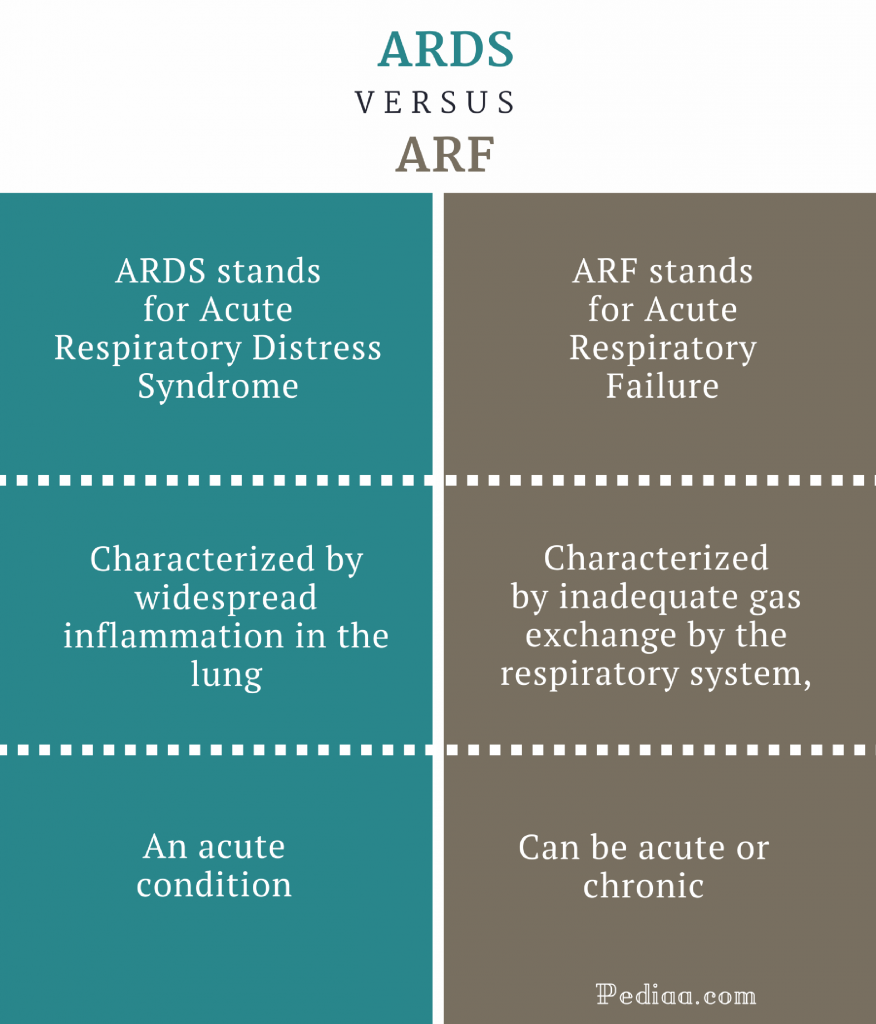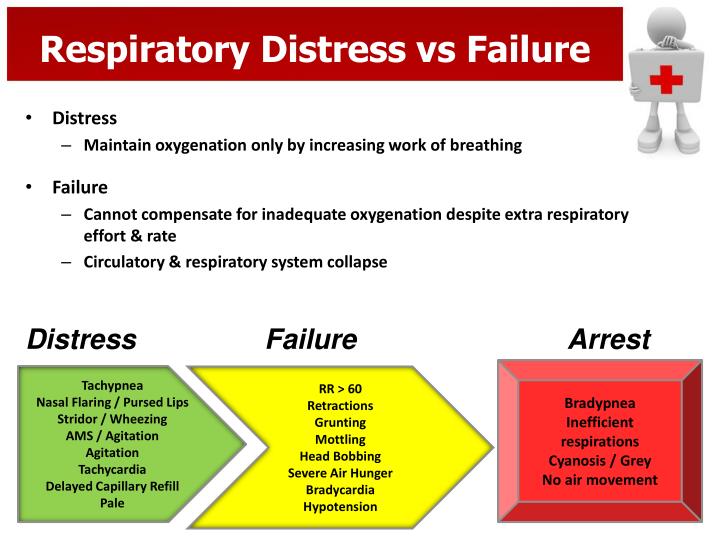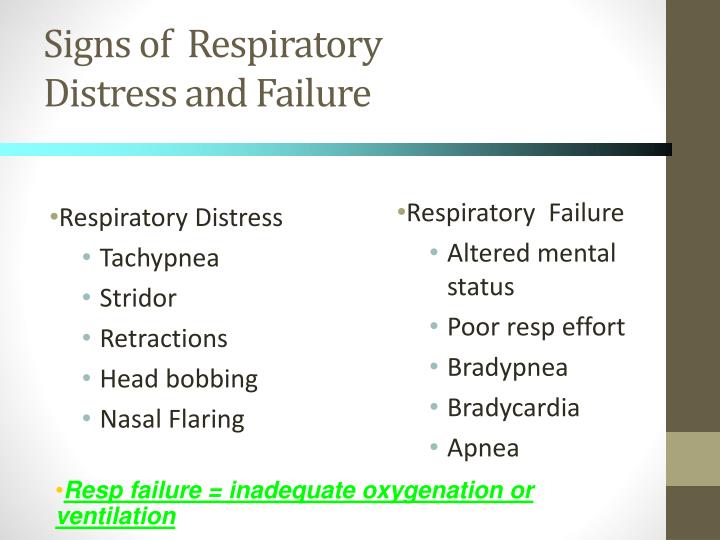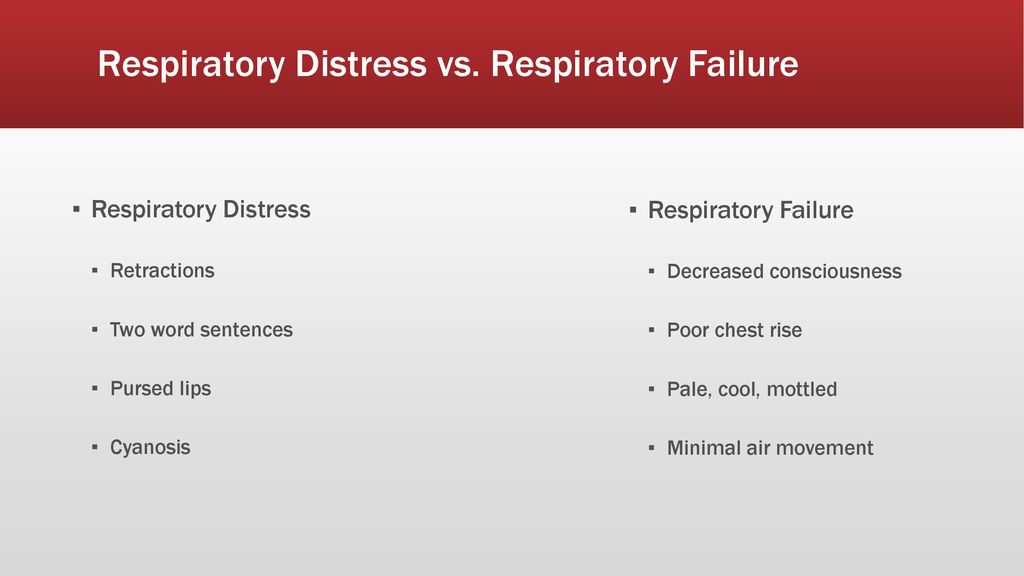Respiratory Arrest Vs Distress - Respiratory distress, or difficulty breathing, is evidenced by signs and symptoms such as shortness of breath, gasping for breath,. Respiratory distress is a clinical state characterized by abnormal (increased or decreased) respiratory rate or effort. • differentiate between respiratory distress and respiratory failure • explain when to oxygenate and when to ventilate a patient • discuss the aha’s. Let’s take a look at the difference between respiratory distress, failure, and arrest and how to treat respiratory arrest.
Let’s take a look at the difference between respiratory distress, failure, and arrest and how to treat respiratory arrest. Respiratory distress, or difficulty breathing, is evidenced by signs and symptoms such as shortness of breath, gasping for breath,. • differentiate between respiratory distress and respiratory failure • explain when to oxygenate and when to ventilate a patient • discuss the aha’s. Respiratory distress is a clinical state characterized by abnormal (increased or decreased) respiratory rate or effort.
• differentiate between respiratory distress and respiratory failure • explain when to oxygenate and when to ventilate a patient • discuss the aha’s. Let’s take a look at the difference between respiratory distress, failure, and arrest and how to treat respiratory arrest. Respiratory distress, or difficulty breathing, is evidenced by signs and symptoms such as shortness of breath, gasping for breath,. Respiratory distress is a clinical state characterized by abnormal (increased or decreased) respiratory rate or effort.
Difference Between ARDS and ARF Clinical Features, Cause, Signs and
Respiratory distress, or difficulty breathing, is evidenced by signs and symptoms such as shortness of breath, gasping for breath,. • differentiate between respiratory distress and respiratory failure • explain when to oxygenate and when to ventilate a patient • discuss the aha’s. Let’s take a look at the difference between respiratory distress, failure, and arrest and how to treat respiratory.
PPT Pediatric Respiratory Emergencies PowerPoint Presentation ID
• differentiate between respiratory distress and respiratory failure • explain when to oxygenate and when to ventilate a patient • discuss the aha’s. Respiratory distress, or difficulty breathing, is evidenced by signs and symptoms such as shortness of breath, gasping for breath,. Let’s take a look at the difference between respiratory distress, failure, and arrest and how to treat respiratory.
Respiratory Distress vs Failure vs Arrest Diagram Quizlet
Respiratory distress is a clinical state characterized by abnormal (increased or decreased) respiratory rate or effort. Let’s take a look at the difference between respiratory distress, failure, and arrest and how to treat respiratory arrest. • differentiate between respiratory distress and respiratory failure • explain when to oxygenate and when to ventilate a patient • discuss the aha’s. Respiratory distress,.
Airway algorithm review
Respiratory distress, or difficulty breathing, is evidenced by signs and symptoms such as shortness of breath, gasping for breath,. Respiratory distress is a clinical state characterized by abnormal (increased or decreased) respiratory rate or effort. Let’s take a look at the difference between respiratory distress, failure, and arrest and how to treat respiratory arrest. • differentiate between respiratory distress and.
2017 PARAMEDIC REFRESHER COURSE ppt download
Let’s take a look at the difference between respiratory distress, failure, and arrest and how to treat respiratory arrest. Respiratory distress, or difficulty breathing, is evidenced by signs and symptoms such as shortness of breath, gasping for breath,. Respiratory distress is a clinical state characterized by abnormal (increased or decreased) respiratory rate or effort. • differentiate between respiratory distress and.
PPT Chapter 6 PowerPoint Presentation ID3769623
Respiratory distress, or difficulty breathing, is evidenced by signs and symptoms such as shortness of breath, gasping for breath,. Respiratory distress is a clinical state characterized by abnormal (increased or decreased) respiratory rate or effort. • differentiate between respiratory distress and respiratory failure • explain when to oxygenate and when to ventilate a patient • discuss the aha’s. Let’s take.
Respiratory Distress vs. Failure vs. Arrest EXPLAINED YouTube
Respiratory distress is a clinical state characterized by abnormal (increased or decreased) respiratory rate or effort. Respiratory distress, or difficulty breathing, is evidenced by signs and symptoms such as shortness of breath, gasping for breath,. Let’s take a look at the difference between respiratory distress, failure, and arrest and how to treat respiratory arrest. • differentiate between respiratory distress and.
EMT Refresher Module 1 Airway/Neuro Management ppt download
Let’s take a look at the difference between respiratory distress, failure, and arrest and how to treat respiratory arrest. • differentiate between respiratory distress and respiratory failure • explain when to oxygenate and when to ventilate a patient • discuss the aha’s. Respiratory distress is a clinical state characterized by abnormal (increased or decreased) respiratory rate or effort. Respiratory distress,.
Respiratory Failure vs. Distress
Respiratory distress, or difficulty breathing, is evidenced by signs and symptoms such as shortness of breath, gasping for breath,. Respiratory distress is a clinical state characterized by abnormal (increased or decreased) respiratory rate or effort. • differentiate between respiratory distress and respiratory failure • explain when to oxygenate and when to ventilate a patient • discuss the aha’s. Let’s take.
Respiratory Distress vs. Failure vs. Arrest (2024)
Respiratory distress, or difficulty breathing, is evidenced by signs and symptoms such as shortness of breath, gasping for breath,. • differentiate between respiratory distress and respiratory failure • explain when to oxygenate and when to ventilate a patient • discuss the aha’s. Respiratory distress is a clinical state characterized by abnormal (increased or decreased) respiratory rate or effort. Let’s take.
Respiratory Distress Is A Clinical State Characterized By Abnormal (Increased Or Decreased) Respiratory Rate Or Effort.
Let’s take a look at the difference between respiratory distress, failure, and arrest and how to treat respiratory arrest. Respiratory distress, or difficulty breathing, is evidenced by signs and symptoms such as shortness of breath, gasping for breath,. • differentiate between respiratory distress and respiratory failure • explain when to oxygenate and when to ventilate a patient • discuss the aha’s.









